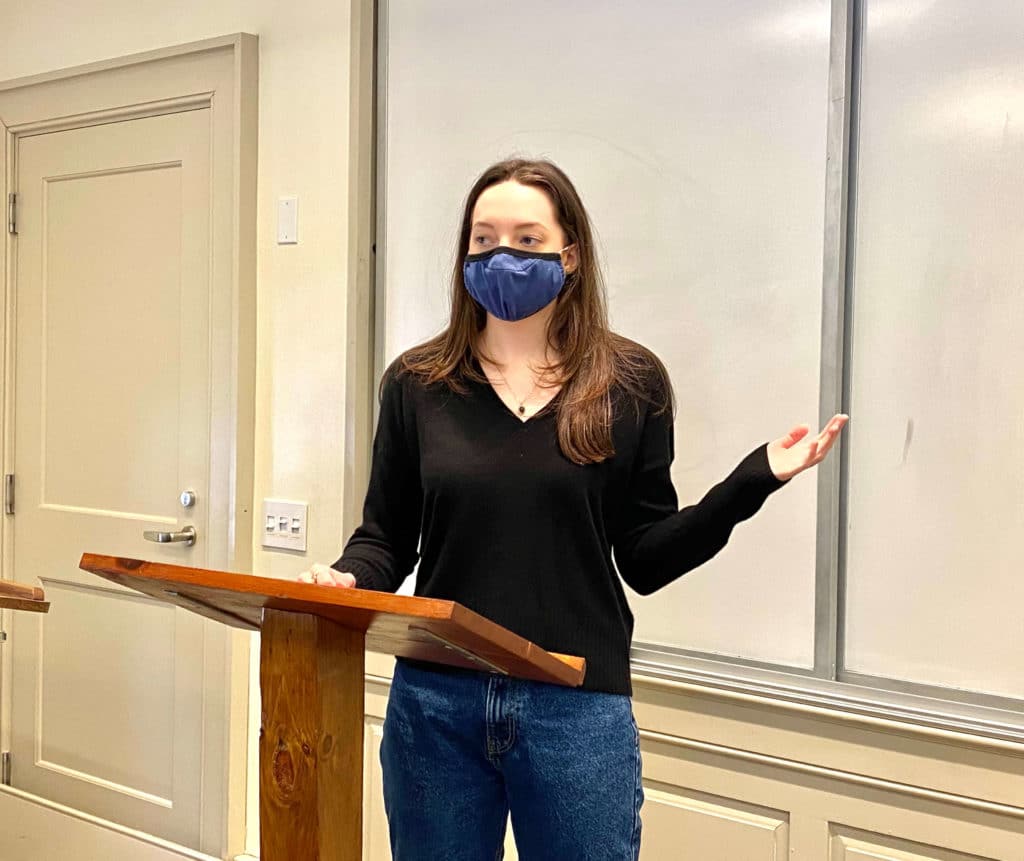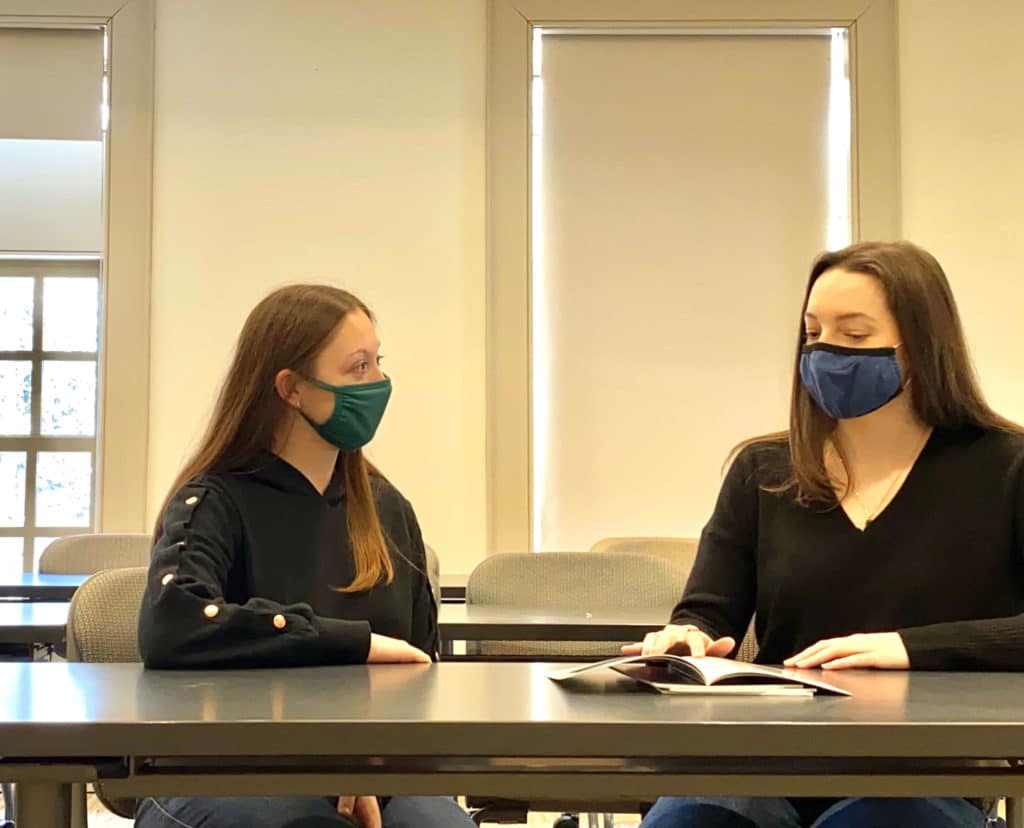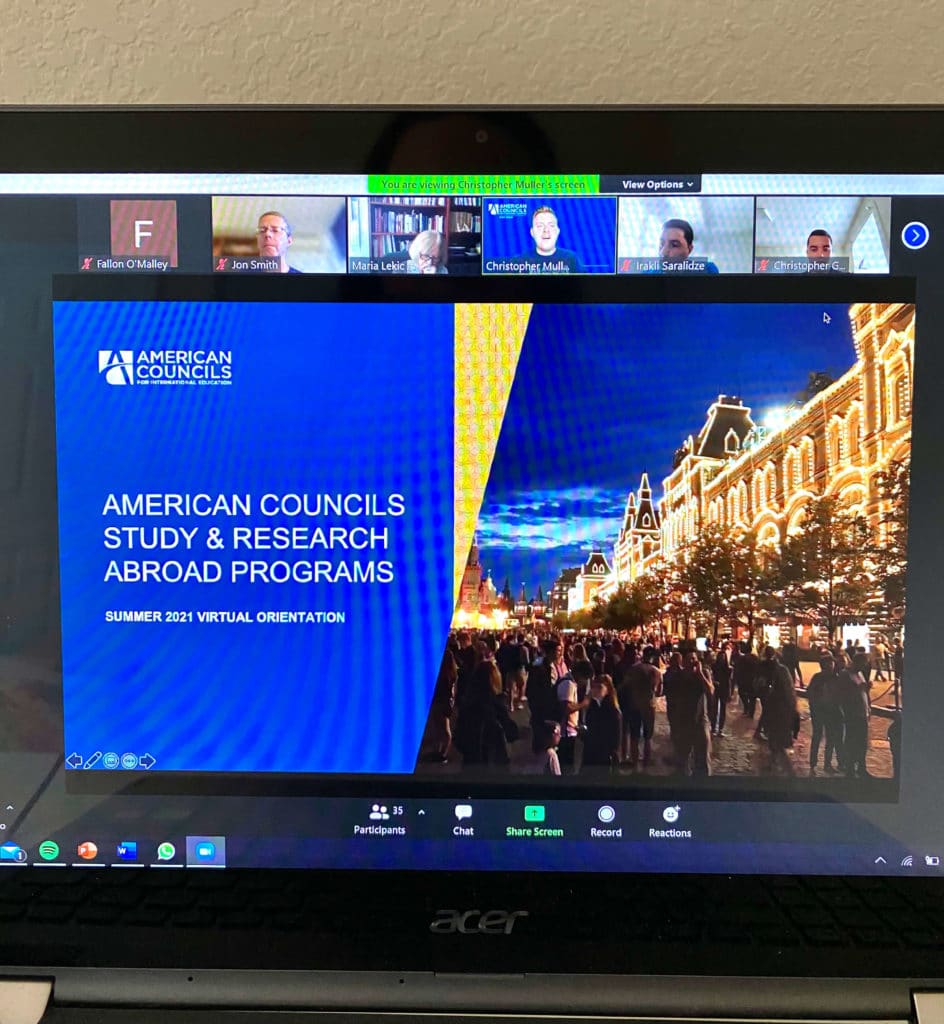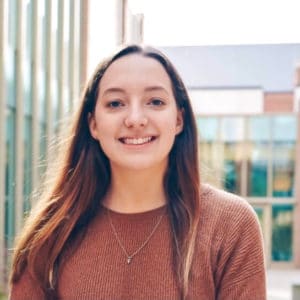
The Fulbright grant program offers the unique opportunity for young leaders to travel the world engaging in cross-cultural learning. But what happens when the Fulbright grant goes virtual? Fulbright grantee Fallon O’Malley, a senior at The College of William & Mary, spoke with ProFellow about her experience completing a virtual Fulbright-Hays Group Projects Abroad (GPA) grant last summer, and how this experience connected her with language mentors from across the globe, all without leaving her house.
This particular Fulbright grant, issued by the U.S. Department of Education, provides funding for advanced overseas Russian and Persian language study through short-term seminars, curriculum development, group research or study, and advanced intensive language programs. Scholarships are awarded to eligible participants in the Advanced Russian Language and Area Studies Program (RLASP) in Moscow, Russia or Almaty, Kazakhstan, and the Eurasian Regional Language Program (ERLP) in Dushanbe, Tajikistan.
While Fallon had initially planned for the fellowship to take her to St. Petersburg, Russia, she ended up completing her Fulbright-Hays GPA grant completely virtually over the summer of 2021, concentrating in Russian language through the RLASP. Read on to learn how Fallon adapted to make the most of this fully virtual Fulbright grant, and to hear her advice on how you can become a Fulbright-Hays GPA grantee.
1. What inspired you to apply for the Fulbright-Hays GPA grant?
I was attracted to the Fulbright-Hays Group Project Abroad grant because it provided an opportunity for me to promote the value of international educational experiences and share how one can participate in language immersion in unique ways. My academic goals were to refine my language skills, gain a deeper understanding of Russian language and culture, and share my experiences with others. The summer of 2021 was a chance for me to learn more about Russian culture and gain experience in building connections across the world. The Fulbright-Hays GPA grant also offered generous aid to students who would not otherwise be able to afford to participate in study abroad programs, opening up a world of possibility.

2. What were the benefits of completing this Fulbright grant virtually?
Originally, I had applied to the RLASP in St. Petersburg, Russia, selecting it as my first option out of three cities. However, once the program was officially switched to a virtual experience due to COVID-19, the fellowship shifted to virtual instruction from all participating institutions, which included Russian State Pedagogical University (Herzen Institute) in St. Petersburg, Russia and Moscow International University in Moscow, Russia. I thought this presented a unique opportunity for participants to network with faculty and students from both of these major Russian cities. Additionally, the virtual nature of the program allowed me to apply for and participate in the Fulbright-Hays GPA grant and also gain access to that network and community so that I was able to connect with others beyond RLASP.
This virtual Fulbright grant gave recipients the opportunity to collaborate with professors and brainstorm ideas for cross-cultural exchange and education, all while never meeting in person. I gained invaluable experience working with students from Russia in developing workforce skills such as active listening, intercultural competence, communication skills, and foreign language proficiency. We ended the summer session with a final presentation and reflection period where students discussed what they gained. Many people spoke about how they overcame anxieties and imposter syndrome about speaking a foreign language. It is completely understandable to have a fear of speaking or making mistakes in the beginning. However, after this experience, I’ve become more confident in public speaking in both English and Russian, which will help me in the next chapter of my studies and in life.

3. What fellowship application tips would you give others who are interested in applying to the Fulbright-Hays GPA grant?
Since the application for this grant is in partnership with the American Council’s RLASP program, I would urge participants to look at the requirements for that program as well, as they are specific and vary depending on which language immersion program you apply to. I was required to submit a short essay in Russian in order to be considered. Other application elements included a statement of purpose, a fellowship essay, and additional short answers in English. I had to undergo interviews for the RLASP program which were conducted in Russian; however, there was no interview for the Fulbright-Hays GPA grant itself.
If any students from the U.S. are considered studying overseas, I highly recommend the RLASP program to students from all walks of life and all levels of Russian language education experience. I was part of a group of students who were from all over the U.S. and were a mix of undergraduates, graduate students, and professionals in the workforce. Though we differed in experience, we shared in our desire to improve our Russian skills and become better students and world citizens.
I encourage those who are interested in applying to the Fulbright-Hays GPA grant or similar Fulbright scholarships to never discourage yourself from applying. Always feel free to ask questions to the Fellowship Coordinator or Program Director for awards that you are interested in. I reached out to the coordinators several times with questions about the application process, writing sample topics, and more. I always left my conversations feeling increased confidence in my ability to turn in a good application.
One of my biggest tips is to write honestly, but with intention. Everyone has a unique story and it is up to you to tell it. Understand your particular audience and discuss how your interests set you apart from other applicants, but also relate directly to the purpose of the fellowship itself. Be specific about post-completion as well. It is one thing to say you are passionate about accessible education, but another to say how you would share your knowledge post-program with students in your native country. It is important to tie everything back to program requirements while also explaining your own interests and interpretation of how language learning is realized and acquired. Trust yourself throughout the process and believe in your answers first because if you do, no one can doubt your writing and convictions. Finally, enjoy the finished application product. I ended up writing several drafts before my essay was polished for submission. That process in itself is a big accomplishment and should be celebrated.

Sign up to bookmark the Fulbright-Hays Group Projects Abroad (GPA) Program to your ProFellow account. To be eligible for Fulbright-Hays GPA program funding, applicants must meet the requirements of their selected program, be U.S. citizens or permanent residents, and be currently employed full-time in a United States school system, institution of higher education, local education agency or state education agency.
© ProFellow, LLC 2022, all rights reserved.